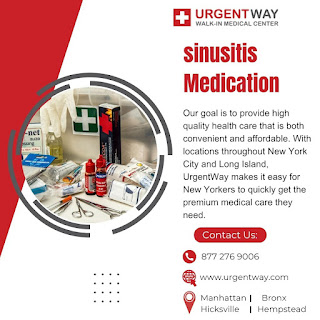Are there any sinusitis medications that do not cause drowsiness?
Are there any sinusitis medications that do not cause drowsiness?
Introduction:
It's crucial to comprehend what sinusitis is and why it needs to be treated before starting any medicine. The sinuses are mucous membrane-lined, air-filled cavities in the bones around the nose. Mucus accumulates when these membranes become irritated as a result of an infection or an allergy, creating pressure and obstructions. Sinusitis symptoms can include:
·
congestion of the nose
·
Pressure or pain in the face
·
A headache
·
Thick mucus that is stained
·
Smell loss
·
Sore throat or coughing
·
Prescription and over-the-counter (OTC) treatments
can help, but many of them—particularly decongestants and antihistamines—are
known to make you sleepy.
·
Drowsiness can be a major issue for people who
have to work, drive, or be alert during the day.
The antihistamines used to treat allergy
symptoms or some decongestants that impact the central nervous system are
frequently the cause of drowsiness when taking sinusitis medications. The body
produces molecules called histamines that exacerbate allergy symptoms and
inflammation. Although earlier "first-generation" antihistamines,
such as diphenhydramine (Benadryl), can readily penetrate the blood-brain
barrier and produce drowsiness, antihistamines function by inhibiting these
molecules.
Although they are more frequently linked to anxiety or restlessness,
decongestants like pseudoephedrine (Sudafed) can also make some people drowsy.
The secret is to identify drugs that effectively relieve symptoms without
having these drowsy side effects.
Options for Treating Sinusitis Without Sleep
Fortunately, there are a number of sinusitis drugs that don't usually make you
sleepy. Some of these non-drowsy solutions fall under the categories listed
below.
1. Antihistamines of the third generation
Since second-generation antihistamines have a harder time passing across the
blood-brain barrier, they are less likely to make you feel sleepy. These drugs
work well for treating allergy-related sinusitis symptoms.
One common non-drowsy antihistamine is loratadine, sometimes known as claritin.
It is an excellent option for people who require relief from sneezing, runny
nose, and sinus congestion without feeling drowsy because it blocks histamine
receptors without producing sleepiness.
For sinusitis brought on by allergies,
Fexofenadine (Allegra) is an additional useful treatment. Due to its reputation
as one of the least sedative antihistamines, it is an excellent option for use
throughout the day.
Cetirizine (Zyrtec): Generally regarded as a non-drowsy antihistamine,
cetirizine can make some persons drowsy. If sleepiness is an issue, it could be
better used in the evening because it is a little more sedative than loratadine
or fexofenadine.
2. Corticosteroids in the nose
When sinusitis is brought on by inflammation or allergies, nasal
corticosteroids are a very successful treatment. By lessening nasal tube
inflammation, these drugs relieve pressure and congestion without making you
feel sleepy.
Fluticasone, often known as flonase, is a
common nasal spray that helps lessen sinus congestion and inflammation. It can
be used every day to treat chronic sinusitis and is non-sedative.
Another nasal corticosteroid that works well for treating sinusitis symptoms is
mometasone, often known as Nasonex. Under medical supervision, it is safe for
long-term usage and does not make you drowsy.
Budesonide (Rhinocort): For people with sensitive nasal passages,
Budesonide is a mild yet efficient solution. It relieves symptoms without
causing drowsiness.
3. Irrigation and Saline Nasal Sprays
Drug-free treatments for sinusitis include saline nasal sprays and irrigation
solutions. They lessen congestion by removing mucus and allergens from the
nasal passages without increasing the chance of negative side effects like
sleepiness.
Saline
Rinse (Neti Pot): By using a neti pot filled with saline solution, you can help
clear your sinuses and lessen congestion and irritation. Both acute and chronic
sinusitis can be effectively treated with this non-sedative, safe technique.
Saline Nasal Spray: To keep the nasal passages wet and lessen congestion, use
over-the-counter saline sprays multiple times a day. They are especially
beneficial for people who choose a non-pharmacological method of sinus
treatment.
4. Sleep-Inducing Decongestants
The purpose of decongestants is to help open the airways by constricting the
enlarged blood vessels in the nasal passages. Certain decongestants, such as
pseudoephedrine, are designed to be non-drowsy, while others may make you
drowsy or restless.
Sudafed PE contains phenylephrine, a typical non-drowsy decongestant that is
present in many over-the-counter drugs. It may not be as effective as
pseudoephedrine, but it can temporarily relieve nasal congestion without
sedating the user.
Oxymetazoline, often known as Afrin, is a nasal spray decongestant that
effectively relieves congestion in the nose. Although it doesn't make you
sleepy, you should only use it for a few days at a time to prevent rebound
congestion.
Sinus Infection doctor At UrgentWay Walk-In
Clinic
Sinus infection treatment is available at all
UrgentWay locations. We are open seven days a week from morning to evening,
giving you the freedom to visit us whenever it is convenient. Our experienced
providers will assess your condition, advise the best sinus infection treatment
accordingly and counsel you on preventative care.
Conclusion:
Although sinusitis can be an excruciating and annoying ailment, there are
numerous efficient treatment choices that don't make you feel sleepy. Effective
relief without sacrificing alertness is offered by saline sprays, nasal
corticosteroids, second-generation antihistamines, and some decongestants. You
may control your sinusitis symptoms without compromising your regular
activities by making an informed decision based on your knowledge of the
various drug kinds and possible adverse effects. If you are unclear which
choice is best for you, especially if your symptoms are severe or persistent,
always get advice from a healthcare professional. You may get rid of sinusitis
without having to deal with the unpleasant side effect of being sleepy if you
take the proper method.
.png)



Comments
Post a Comment